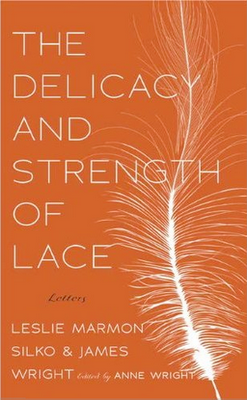The Delicacy and Strength of Lace

The Delicacy and Strength of Lace is a rare and beautiful collection, illustrating the power of artful expression in a time when communication is, more often than not, abrupt, cursory, and expedient. The book, composed of letters exchanged between Leslie Marmon Silko, a celebrated fiction writer, and James Wright, a Pulitzer Prize-winning poet, is an "epistolary classic," and it performs the remarkable feat of capturing, in a tangible, material way, the nature of a friendship.
Their correspondence ranges over little more than a year, and in that short time, their relationship sees Silko's divorce, child custody struggles, and professional turmoil, and Wright's own family tragedies, flourishing career, and finally, his illness and death. They write each other at a spirited pace, even while Wright travels through Europe and while Silko bounces across the United States; detailed address lists and itineraries are tucked into their notes about landscapes and heartaches. Their devotion to one another is made all the more extraordinary by the fact that their friendship was initiated and maintained almost exclusively through letters. Its success was due, in part, to their shared facility with language, which allowed them a candor that would have been lost in the hands of less capable writers. The missives are written with such charm and sincerity that they do not feel like mere evidence of friendship, but like the substance of it.
The correspondence begins timidly, with some mutual flattery and formality, but blooms almost immediately into intimate conversation:
"Dear Mrs. Silko," Wright begins, "I trust you won't mind hearing from a stranger... I have finally had the chance to read _Ceremony, and I am moved to tell you how much the book means to me... I am very happy that you are alive and writing books."_
"Dear Mr. Wright," Silko returns, "Your letter came at a time when I needed it most. So many sad things have happened with my marriage and my children—it is good to know that my work means something..."
Silko writes with the ease of a natural storyteller, ambling from anecdotes about her farm to her personal and professional troubles. "Dear Jim," she writes in her second letter, "I just fed the rooster a blackened banana I found in the refrigerator. He has been losing his yellowish collar feathers lately, and I'm afraid it might be that he isn't getting enough to eat. But I suppose it could be his meanness too." Wright volleys with his own observations about writing and teaching. Where Silko writes with tenacity and sadness, Wright's letters are milder but more ominous. "It has been a pleasure to teach and work here in Delaware, but now once again I can feel time closing in on me, and there are still many tasks to be performed and many duties to be met," he writes, a foreshadowing of the cancer diagnosis that will kill him a year later.
The Delicacy and Strength of Lace was first published in 1985, and its reprinting today seems designed to point out that these kinds of epistolary relationships have all but disappeared. One may be tempted to blame email and blogs and Twitter, but to lament the informality of modern communication is miss a greater truth: Silko and Wright's remarkable correspondence was born out of their mutual love for writing. Their letters were crafted with a mixture of skill and affection that has always been rare. The immediacy and volume of modern communication may have diluted the frequency of clear, heartfelt expression, but this collection shows that our appetite for it is undiminished.